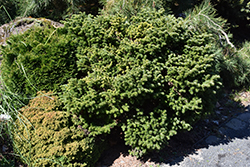Fri & Sat 8am - 8pm
Sun 8am - 7pm
Anytown, USA 12345
fax: 261.787.0463
e-mail: info@successgc.com


Plant Finder

Height: 4 feet
Spread: 4 feet
Sunlight:
![]()
![]()
Hardiness Zone: 4a
Other Names: Caucasian Fir
Description:
An outstanding, slow growing selection with a flat, rounded, bun shaped habit; fine foliage emerges yellow-green, maturing to medium green; particular about growing conditions, not for hot, dry or windy sites
Ornamental Features
Munsterland Nordmann Fir has attractive green evergreen foliage which emerges chartreuse in spring on a dwarf conifer with a mounded habit of growth. The needles are highly ornamental and remain green throughout the winter. The smooth gray bark adds an interesting dimension to the landscape.
Landscape Attributes
Munsterland Nordmann Fir is a dense multi-stemmed evergreen shrub with a mounded form. Its relatively fine texture sets it apart from other landscape plants with less refined foliage.
This is a relatively low maintenance shrub, and usually looks its best without pruning, although it will tolerate pruning. It has no significant negative characteristics.
Munsterland Nordmann Fir is recommended for the following landscape applications;
- Accent
- Rock/Alpine Gardens
- General Garden Use
Planting & Growing
Munsterland Nordmann Fir will grow to be about 4 feet tall at maturity, with a spread of 4 feet. It tends to fill out right to the ground and therefore doesn't necessarily require facer plants in front. It grows at a slow rate, and under ideal conditions can be expected to live for 90 years or more.
This shrub does best in full sun to partial shade. It prefers to grow in average to moist conditions, and shouldn't be allowed to dry out. It is not particular as to soil pH, but grows best in sandy soils. It is quite intolerant of urban pollution, therefore inner city or urban streetside plantings are best avoided, and will benefit from being planted in a relatively sheltered location. Consider applying a thick mulch around the root zone in winter to protect it in exposed locations or colder microclimates. This is a selected variety of a species not originally from North America.
